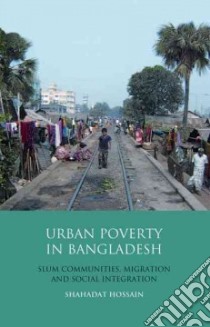Urban Poverty in Bangladesh - 9781848854703
Un libro in lingua di Shahadat Hossain edito da Tauris Academic Studies, 2010
- € 113.50
- Il prezzo è variabile in funzione del cambio della valuta d’origine
This exploration of urban poverty in Bangladesh offers a unique contribution to the understanding and analysis of the phenomenon of rapid mass urbanization and its social consequences, specifically the formation of huge urban slums and new forms of urban poverty. Its focus is the analysis of poverty, which has hitherto been overwhelmingly dominated by economic approaches, thus neglecting the social aspects of poverty.
Urban Poverty in Bangladesh seeks to redress the balance by approaching social questions and conceptualising urban poverty through its inclusion of both material and non-material dimensions. It is based on data collected from over 500 poor households living in Dhaka slums. The survey data is supplemented by qualitative data collected through a number of in-depth interviews with poor communities. It reveals that poverty in Dhaka slums is most strongly influenced by recent migration from rural areas, household organization, participation in the 'informal' sector of the economy and access to housing and land. Almost half of the urban poor were identified as 'hardcore poor', that is, having insufficient income for their physical needs. The remainder was found to be 'absolute poor', those who experienced poverty and vulnerability but varied in their levels of income and consumption. This level of poverty was also characterised by their social, cultural and political marginalization.
Despite living in the city for a long period of time the urban poor are often excluded from urban institutions. They remain very much dependent on their families and social networking: the main social capital they use to adapt to urban life. Here, Hossain argues that the experience of poverty for slum communities in the megacity of Dhaka follows the pattern of urbanization without development, the very opposite to their expectations and aspirations. This book will be essential for those working in the areas of urban studies, development studies, Asian studies and sociology and social policy studies.
Informazioni bibliografiche
- Titolo del Libro in lingua: Urban Poverty in Bangladesh
- Sottotitolo: Slum Communities, Migration and Social Integration
- Lingua: English
- Autore: Shahadat Hossain
- Editore: Tauris Academic Studies
- Collana: Tauris Academic Studies (Hardcover)
- Data di Pubblicazione: 15 Dicembre '10
- Genere: SOCIAL SCIENCE
- Argomenti : Sociology, Urban Bangladesh Dhaka Poverty Bangladesh Dhaka
- Pagine: 252
- ISBN-10: 1848854706
- EAN-13: 9781848854703


